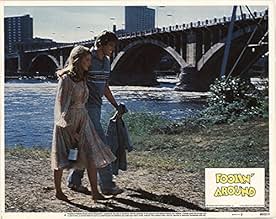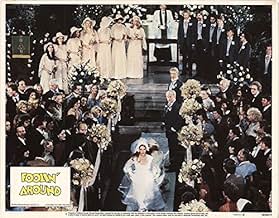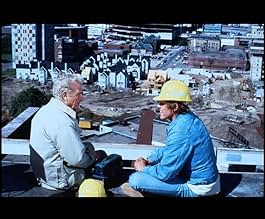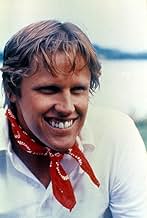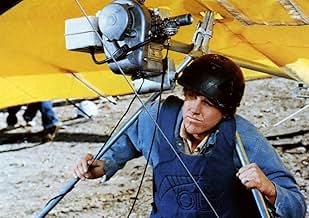Ein Junge aus der Arbeiterklasse verliebt sich in ein Mädchen aus einer wohlhabenden Familie und muss für sie mit einem reichen Jungen konkurrieren, der sie ebenfalls will.Ein Junge aus der Arbeiterklasse verliebt sich in ein Mädchen aus einer wohlhabenden Familie und muss für sie mit einem reichen Jungen konkurrieren, der sie ebenfalls will.Ein Junge aus der Arbeiterklasse verliebt sich in ein Mädchen aus einer wohlhabenden Familie und muss für sie mit einem reichen Jungen konkurrieren, der sie ebenfalls will.
William H. Macy
- Bronski
- (as W.H. Macy)
Empfohlene Bewertungen
If you scout around a little bit here on IMDb you'll find Siskel and Ebert hating this film with vigor. They're really wrong IMO. The movie is worth watching. I'm not saying it's a comedy classic--there's a fair bit of dumb crap to wade through, and the last 10 minutes are weak--but its best moments are fun and interesting. For example, Eddie Albert's scene at the construction site with Gary Busey, at 1:14:00, is honest and powerful, yeah a bit melodramatic, but the actors keep it mostly real. Notice how Albert deliberately drops an apple, to show the height they're at, and then has another one ready to eat.
Annette O'Toole and Busey have definite chemistry. O'Toole is the making of the picture. This is some of her best work. She captures something essential about a young woman having trouble deciding about her future. I'm surprised that both Siskel and Ebert fail to see the quality of her performance. (The filmmakers missed a great shot by not adequately lighting her face when she invites Busey into the back of the van. The cinematographer, Philip Lathrop, should be docked a week's pay for that.)
Look for William H. Macy early in a small role; the scene is important because Busey needs to prove his mettle and his slight craziness, and does so. I laughed out loud at Tony Randall's work. Eddie Albert, who grew up in Minnesota, played two interesting Minnesota business leader types in his career: here and in "The Heartbreak Kid," 1972 version. (If you know the Twin Cities at all, "Foolin' Around" and "The Heartbreak Kid" are must-sees. The former is free on YouTube.)
Annette O'Toole and Busey have definite chemistry. O'Toole is the making of the picture. This is some of her best work. She captures something essential about a young woman having trouble deciding about her future. I'm surprised that both Siskel and Ebert fail to see the quality of her performance. (The filmmakers missed a great shot by not adequately lighting her face when she invites Busey into the back of the van. The cinematographer, Philip Lathrop, should be docked a week's pay for that.)
Look for William H. Macy early in a small role; the scene is important because Busey needs to prove his mettle and his slight craziness, and does so. I laughed out loud at Tony Randall's work. Eddie Albert, who grew up in Minnesota, played two interesting Minnesota business leader types in his career: here and in "The Heartbreak Kid," 1972 version. (If you know the Twin Cities at all, "Foolin' Around" and "The Heartbreak Kid" are must-sees. The former is free on YouTube.)
"Foolin' Around" is one of those films that harkens back to 1930s screwball comedy, and that knows enough not to take itself too seriously. Likewise, it knows one of the key lessons of such comedies -- get likeable leads together with wonderful supporting actors to make the genre work.
Busey (one of my favorite actors when he's on his game) plays a good ol' boy who's going to the University of Minnesota who falls in love with fellow coed O'Toole. Despite the fact that she's ostensibly spoken for (with obnoxious boor Calvin), a romance blooms between the two of them, not the least because her grandfather (Eddie Albert, in an extremely fun character performance) sees in Busey a lot of the same blue collar roots and values that brought him to the top. Busey is wonderfully likeable (as he usually is) as is O'Toole, but it is Albert, Cloris Leachman (as O'Toole's status-conscious mother) and Tony Randall (hilarious as their stiff-as-a-board butler) that really get into the screwball spirit. Randall's efforts to keep track of a mysteriously disappearing and reappearing bag and his (off-screen) sex scene with Leachman are among the many highlights in this film.
On a one-to-ten scale, this film definitely hits a 7 1/2.
Busey (one of my favorite actors when he's on his game) plays a good ol' boy who's going to the University of Minnesota who falls in love with fellow coed O'Toole. Despite the fact that she's ostensibly spoken for (with obnoxious boor Calvin), a romance blooms between the two of them, not the least because her grandfather (Eddie Albert, in an extremely fun character performance) sees in Busey a lot of the same blue collar roots and values that brought him to the top. Busey is wonderfully likeable (as he usually is) as is O'Toole, but it is Albert, Cloris Leachman (as O'Toole's status-conscious mother) and Tony Randall (hilarious as their stiff-as-a-board butler) that really get into the screwball spirit. Randall's efforts to keep track of a mysteriously disappearing and reappearing bag and his (off-screen) sex scene with Leachman are among the many highlights in this film.
On a one-to-ten scale, this film definitely hits a 7 1/2.
No other movie has ever been made or will ever be made that can top Foolin' Around. Gary Busey's performance is pure genius. The amount of times someone gets hit in the nuts only leaves you wanting more. "Everytime I get around that guy something goes Haywire"...
This little seen film, which I caught for the first time over twenty years ago, is a wonderful throwback to 1930's screwball comedy in more ways than one. Young hick (Busey) starts college at the University of Minnesota, and falls in love with debutante O'Toole, despite her mother's intentions to marry her to society dolt Calvin. What ensues are a series of pratfalls and slapstick bits that, while not terribly deep, are nonetheless quite funny. More importantly, Busey and O'Toole are so damn likeable, you really do want them to fall in love.
But, like all great 1930s comedies, what makes the film sparkle is not the lead performances (in the 30s, these were usually played by likeable ingenues without much depth), but by the character actors who formed the background for the story. This film is no different in that the film is practically stolen from the leads by three splendid supporting performances -- Cloris Leachman as O'Toole's society-conscious mother, Eddie Albert as O'Toole's crusty grandfather and Busey's boss, and especially Tony Randall as Leachman's butler. Randall's performance deserves special note because his stiff demeanor is beautifully contrasted with his profane and off-color dialogue (the final words we hear from him, behind closed doors, almost made me fall off my chair laughing).
While no masterpiece, this is a wonderful picture to watch if you'd like a brief look at a long lost style of filmmaking.
But, like all great 1930s comedies, what makes the film sparkle is not the lead performances (in the 30s, these were usually played by likeable ingenues without much depth), but by the character actors who formed the background for the story. This film is no different in that the film is practically stolen from the leads by three splendid supporting performances -- Cloris Leachman as O'Toole's society-conscious mother, Eddie Albert as O'Toole's crusty grandfather and Busey's boss, and especially Tony Randall as Leachman's butler. Randall's performance deserves special note because his stiff demeanor is beautifully contrasted with his profane and off-color dialogue (the final words we hear from him, behind closed doors, almost made me fall off my chair laughing).
While no masterpiece, this is a wonderful picture to watch if you'd like a brief look at a long lost style of filmmaking.
This movie has too much adult material in it, but if you accept that fact, it is a pretty good movie. Busey plays Wes, a likable underdog from Fort Cobb, Oklahoma. His friend Clay has been going to the University of Minnesota, and Wes enrolls to learn building engineering. Susan's grandfather offers wisdom to young Wes. Seals and Crofts perform the title song and "These Moments Never Live Again." The movie paints Minnesota in a favorable light. It shows a Vikings game and the Mississippi River, and it gives you the feeling you're right there. There is a lot of silliness in this movie, but, then, it's called "Foolin' Around."
Wusstest du schon
- WissenswertesFoolin' Around (1980) and Ein tödlicher Traum (1980) were the first theatrical feature films of actor William H. Macy where he was billed in both as "W.H. Macy". Ein tödlicher Traum (1980) released first stateside in early October 1980 prior to Foolin' Around (1980) premiering in the USA about a fortnight later mid October 1980.
- Zitate
Daggett - a retired tycoon, Susan's grandfather: [Daggett to Wes] Your dog can be a friend, booze can be your friend, but if you have a girl for a friend you'll end up drunk kissing your dog.
- Alternative Versionen"Videotape versions of the film are ten minutes shorter" according to the American film guide publication 'Rating the Movies'.
- SoundtracksFoolin' Around
Music and lyrics by Jim Seals and Charles Bernstein
Performed by Seals and Crofts
Top-Auswahl
Melde dich zum Bewerten an und greife auf die Watchlist für personalisierte Empfehlungen zu.
- How long is Foolin' Around?Powered by Alexa
Details
- Erscheinungsdatum
- Herkunftsland
- Sprache
- Auch bekannt als
- Fooling Around
- Drehorte
- 1350 Nicollet Avenue, Minneapolis, Minnesota, USA(exteriors: construction site)
- Produktionsfirmen
- Weitere beteiligte Unternehmen bei IMDbPro anzeigen
Zu dieser Seite beitragen
Bearbeitung vorschlagen oder fehlenden Inhalt hinzufügen

